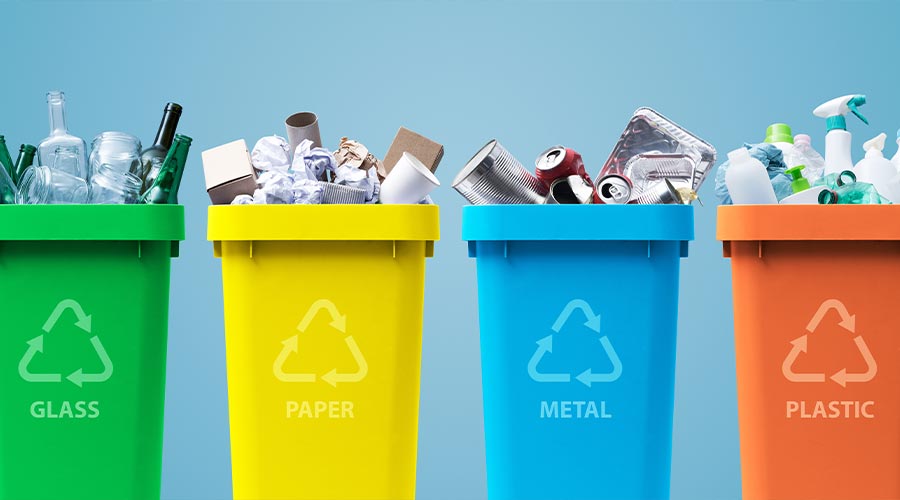
The first Earth Day took place in the USA on April 22,1970; over half a century ago. It was founded as a nationwide “teach-in” to highlight support and activities for environmental protection and continues to be observed globally each year in more than 193 countries, focused on a wide range of coordinated events, education, and action.
A cornerstone of Earth Day's action items is the promotion of sustainability. Surveys consistently show that more than 75 percent of respondents say that environmental sustainability is important and they want to lead more sustainable lives. Despite the ongoing public emphasis on sustainability, many building owners and managers lack a comprehensive understanding of regulations regarding waste disposal, diversion, and recycling. They may also push back against recycling and waste diversion efforts, citing the cost as not worth the bother.
Adding to the resistance is the fact that there are currently no federal laws mandating recycling in the U.S. This opens the door to state and local governments to have autonomy in establishing their own waste management and recycling policies, or not. As an industry, navigating these varying regulations can be challenging.
Distributors can partner with building service contractors (BSCs) and in-house facility cleaning manager end users to serve as a valuable resource, providing guidance on waste audits, equipment selection (e.g., recycling bins, compactors), and the development of comprehensive waste diversion plans. By educating end users on best practices, assisting with program implementation/modernization, and staying abreast of evolving regulations, distributors can play a crucial role in helping their clients develop and achieve their sustainability goals, and reduce their environmental impact.
Conduct a Waste Audit
A logical starting point for developing a sustainable waste disposal and diversion program is a waste audit. The U.S. Environmental Protection Agency (EPA) defines a waste audit, or assessment, as identifying waste generated at a facility, along with a review of purchasing and management practices. The process examines existing waste reduction practices and assesses their effectiveness. It also identifies the areas and materials in which waste reduction efforts will be most effective. The EPA offers instructions on conducting waste audits, along with worksheets on their website.
“Waste audits are truly the best place to start, but they can feel overwhelming if you’ve never done one,” says Amber Reyna, Chief Revenue Officer, Verde Clean, Phoenix, Arizona. “There’s an upfront cost, you need space to sort and analyze trash, and, let’s be honest, it’s not the most glamorous process. You’re essentially paying a professional to dig through garbage. As unappealing as that may sound, an audit is essential for understanding what’s really happening at a facility and identifying where a client can reduce, reuse, or recycle more effectively.”
Offering customers assistance and guidance in conducting a waste audit will allow distributors and their end user partners to tailor a program for waste collection and disposal that will meet their needs as well as align with state and local regulations.
“Many businesses assume they’re already doing a decent job with waste diversion, but once we conduct an audit, they’re often shocked at how much more could be kept out of the landfill. Once you have that data, making improvements isn’t just easier — it’s measurable, strategic, and impactful.” Reyna confirms.
Even if a business or building owner is reluctant to invest time and money in an audit, there still exist local and state regulations that must be met. Distributors should remain up-to-date on existing and evolving regulations in order to meet the needs of their customers.
“We help customers, not only with training and knowledge about laws in our service areas, but the product needed to meet the requirements,” says Theresa Cummins, Vice President of Sales-West, Imperial Dade, Loma Linda, California. “We encourage each customer to make choices within their budgets to follow the guidelines of each state's policies.”
Cummins says they have a number of individuals who are well versed on laws and, “along with that, we work closely with our vendor partners to ensure our customers are implementing the programs.” This hands-on involvement includes setting up training classes and offering literature to help customers make decisions on the right products for their application.
“I always recommend customers conduct a self-audit throughout the year to ensure the program is being followed as it is designed,” she adds.
Customize Waste Audits to Improve Sustainability Efforts

 The Down and Dirty on Cleaning in Virus Season
The Down and Dirty on Cleaning in Virus Season How Surfactant Use is Expanding in Commercial Cleaning
How Surfactant Use is Expanding in Commercial Cleaning